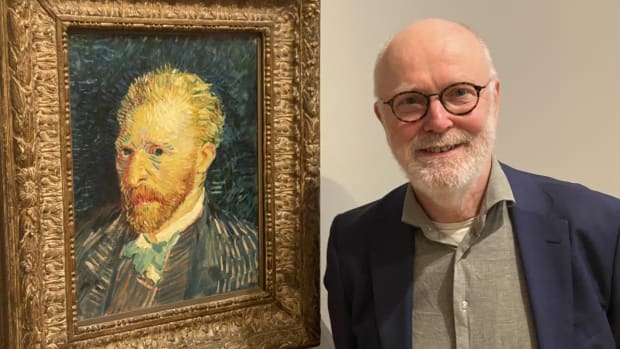
After 10 years, UvA's professor of Van Gogh studies says goodbye: “I underestimated his ambition”
Van Gogh professor Louis van Tilborgh gave his farewell lecture in the auditorium last Friday. As senior researcher at the Van Gogh Museum, he researched the work and life of Vincent van Gogh (1853-1890) and gave lectures and tutorials at the UvA on the painter to students. “Sometimes you are completely surprised by the perspective of students. I enjoyed that incredibly.”
Can you look back on the past 10 years with satisfaction?
“The study groups were always great fun to teach, even if in hindsight they could have been a bit more structured. I first let the students themselves indicate where their needs lay, what they wanted to know, which aspect of Van Gogh they wanted to cover, and especially the ‘why.’ But then the most interesting discussions followed.”
- In 2014, the art historian van Tilborgh assumed the Van Gogh Chair, at the time of its introduction.
- His research focused on various aspects of Van Gogh, including authenticity issues and contributions to various catalogs of the painter.
- Van Tilborgh’s most recent contribution was an article on Van Gogh's self-inflicted demise in the catalog of the exhibition "Van Gogh in Auvers-sur-Oise" now on view at the Musée d'Orsay in Paris.
- Earlier he published articles on Van Gogh's self-portraits, how he was influenced by Japanese art, and gave a new interpretation of Vincent's chair.
“After all, you can study works of art in so many ways, but there is usually an essential question and you have to find it. So the key is to cast your net as wide as possible because if the context gets bigger, you will see more. Lately, I've been paying a lot of attention to the question of whether Van Gogh's mental illness now matters in understanding his work. This was because of my research for the stunning exhibition of Van Gogh in Auvers-sur-Oise. Those were his last months, and that produced some lively discussions. Those discussions are not so much about finding the right answer, but about questioning works of art, and asking the question, ‘What is being expressed?’ I enjoyed that immensely.”
How will your students remember you?
“I hope they will remember me as inspired and enthusiastic at least, but other than that, I don't know.” Van Tilborgh laughs.
“You see, the university has broader, interpretive studies, whereas at the museum you focus on more factual details from texts, such as letters. The nice thing for students is that I pay a lot of attention to placing art in context and to iconology, but then I bring that together with specific factual details about Van Gogh himself.”
As a professor, what else have you learned from Van Gogh, your master?
“A question that has occupied my mind a lot in recent years is: What did he think of himself in those final months?”
“What I didn't assess accurately was Van Gogh's ambition. Ostensibly, he didn't rate himself very highly. People also think that in his earliest years, he opposed the cult of genius. But I think that from the beginning he had an incredible ambition to contribute to art. He wanted to compete with Rembrandt.”
“You don't get that impression so much from Van Gogh's letters, in which he partly denies his genius. For example, he calls his works studies and not tableaux; he doesn't see them as paintings in their own right. I think that's an interesting observation. The resulting question became: How did he see himself in the end? If you answer that question, you find out that he saw himself as a kind of ‘artists’ artist,’ someone who had a certain reputation, especially among colleagues, but certainly no more than that. So that turned out to be completely different from what I thought previously. And I find that incredibly fascinating.”
Will there be a successor?
“I fear there will be no successor. Of course, it also has to do somewhat with the peculiarity of my assignment, that I am an art historian, but specialized in Van Gogh. At the museum, there is no art historian with a Ph.D. in Van Gogh at the moment, but that is bound to change. But that's an open question.”
Will you going to miss it?
“Yes, indeed.”

